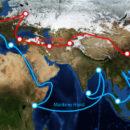Sudan’s Electoral Design
On the eve of the elections, a new report by the Rift Valley Institute explains Sudan’s electoral system, analyses errors in constituency demarcation and warns of potential obstacles to the electoral process. The report highlights the strengths and shortcomings of the new system and its effects on the distribution of power in Sudan.

View the report here:
Electoral Designs: Proportionality, representation and constituency boundaries in Sudan’s 2010 elections.
The report, by Oxford researcher Marc Gustafson, analyses government documents to reveal deficiencies in the demarcation of electoral districts. “Among the most crucial tasks for the National Elections Commission,” the report states, “has been the demarcation of constituency boundaries.” Errors and ambiguities in defining the boundaries, it argues, pose serious challenges to the success of the elections.
In addition to analyzing the demarcation of constituencies, the report also explains how power will likely be divided in Sudan’s National Assembly. Using graphs and tables, the report explains how the new design will work, how it can be exploited and which parties and regions will likely benefit from it. Other issues explored in the report include the logistical challenges of distributing ballots, the proportional allocation of seats in the National Assembly and some contextual analysis of electoral designs throughout Africa. Lastly, the report offers recommendations to assist election officials and national and international observers, particularly in limiting electoral manipulation.
“Electoral Designs” is the second in a series of reports on electoral processes in Sudan published by the Rift Valley Institute. The first, Elections in Sudan: Learning from Experience, a historical study of Sudanese elections by Justin Willis, Atta el”Battahani and Peter Woodward, was published in 2009.






Excellent report. The map of North Darfur is intriguing. Why would these areas be left out? Are these rebel strongholds?
The most interesting part of the report is the fact that it highlights the importance of the legislative elections. So much attention has been paid to the presidential elections, but the legislative elections will be much more transformative. It is surprising to see that Darfur will be allocated almost 20 percent of the seats. But could this change the balance of power in Sudan as much as the report suggests?
Either way, I think this report is likely to make waves given its use of primary sources and the author’s access to individuals close to the boundary demarcation process.
Dear Alex,
This is a terrifically thorough and important report. It answers many of the questions that have been asked recently in the media about ballots, constituencies, the census and many other controversial topics. It also demonstrates exactly, as far as I can tell, which districts have violated electoral laws. Why have these findings not been reported on already?
Also, a recent ICG report on the elections in Darfur suggests that the distribution of seats to Darfur does not matter because the vote is already rigged there? Would you agree? Is there enough evidence to suggest that vote-rigging has already taken place like ICG says?
Yours,
Ahmed
Harold,
Thank you for your remarks. The legislative elections are very important and, as the report demonstrates, will make it difficult for the NCP to continue its dominant role in the National Assembly. In order to maintain its unencumbered ability to pass legislation and make constitutional amendments, the NCP will have to be competitive in Darfur and/or the south. Since it is unlikely that the NCP will be victorious in any southern constituencies, the race in Darfur becomes crucial. So far, the electoral register in Darfur has been peculiar and accusations of manipulation and gerrymandering are rife. Will the balance of power change? This is anyone’s guess, but the current formula for seat allocation will either lead to significant change in the balance of power or force the NCP to take very obvious measures to maintain the status quo.
Ahmed,
Thank you also. I hope my response above answers the second part of your question. As for the violations, it is too difficult to say if these violations were made to favor a particular party or to prevent conflict. Perhaps this is why they have not been reported? Even experts familiar with the demography of each state have not been able to determine why the violations were made. Most of the violations occurred in southern states, and several state committee members have explained to me that the violations were made because there was no other way to create the boundaries without unfairly dividing tribal groups.
What’s puzzling, however, is that there were few violations in Darfur – a place that is also clearly affected by tribal violence – and all of them were fairly minor (15-17%) compared to the violations in the south. It is possible that the population data on which the boundaries were made was so limited in Darfur that the state committees had more flexibility to manage the boundaries within the required limits. The other reason why the violations have been ignored is because they are difficult to find. To find them, one has to search through over 1000 pages of scanned Arabic reports, pulling out the population of each constituency from page to page and calculating the percentage variance for each population from the average. Since these reports are all scanned documents, excel or other tools cannot be used.